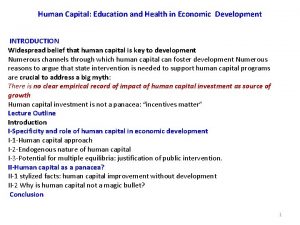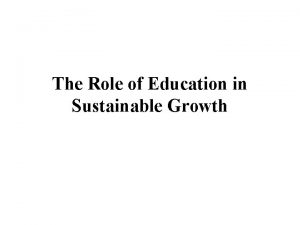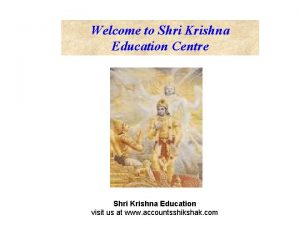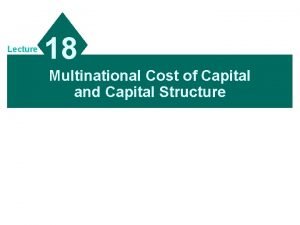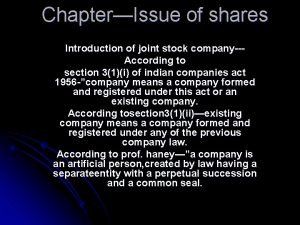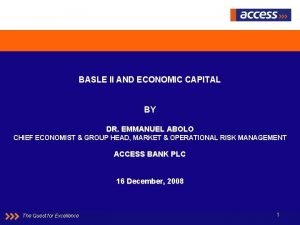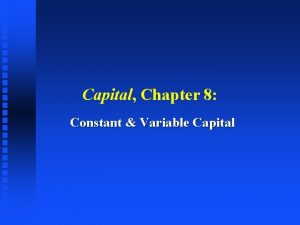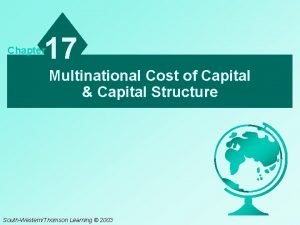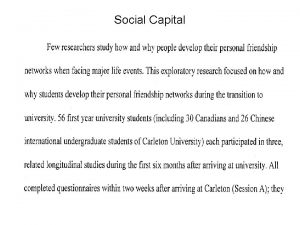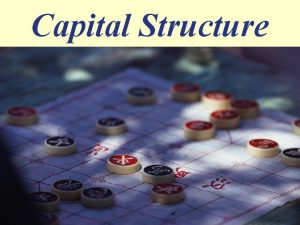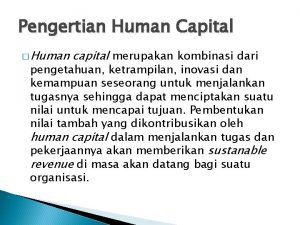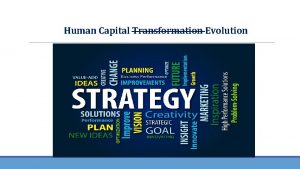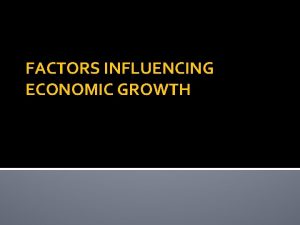The concept of Human Capital Significance of education










- Slides: 10

The concept of Human Capital: Significance of education for individual and economy. • People with more education earn on average higher incomes than people with less education • Additional Education Pays off in the form of higher life time incomes. • The Costs incurred by individuals in acquiring more education constitute an investment in their own future earning capacity. • Higher earnings of educated people is a significant element in the demand for education. • Education is investment from the social point of view, thus a growing economy requires an increasing supply of highly educated man power. Investment in education today , would be future productive capacity of the population.

• After taking an overview of above discussion it seems that the discipline “ the Economics of Education” might have born in 1890 instead of 1960. • The fact is that human agents of production are not bought and sold as machinery and other material agents of production are. • It is no accident that educated people tend to earn more than non-educated (Adam Smith). • In a non-slave society, the individual is his own property. Non-Slave societies lack capital Markets in which rights to future earning power can be traded or in which the promise of earning power can be used as collateral for purposes of borrowing educational finance.

• Marshall was perfectly familiar with Irving Fisher’s definition of capital as’ any stock existing at a given instant that yields a flow of services over time, all flows of income are the product of some item “ capital” whose value is calculated at appropriate discount rate. • Marshall preferred the more conventional definition of that time, which didn’t count the skills of the population to become a part of the capital stock or wealth of an economy.

Education as Consumption and Investment According to Keynesian Theory • Consumption and Investment are the expenditures of two different sectors of the economy, households and business enterprises, and measured in national income accounting. So both are mutually exclusive categories. • In the analysis of economic growth, consumption does not appear to influence growth in the same way as investment does. • With these views, debates starts to decide whether something is consumption or investment.

According to Adam Smith Consumption is the sole end and purpose of all production. • If the sole end were production, there would be no point in including goods consumed in the very instant of production in National Income. • All outputs would be treated as inputs. • Consumption being the inputs into the household sector and measure of aggregate economic activity would be the gross sales of all producing units in the economy including households as producers of labor services. • On the other hand if it is consumption, that is the object of all economic activity , it is difficult to see why investment is counted at all in final output.

According to Irving Fisher • Argued that National Income should represent a flow of final goods and services and that Investment is back into the productive system. • Investment yields additional consumer goods and these goods will be counted in national income when they are consumed in the future. • But to count investment currently as part of income is to count the same thing twice: first, when the Capital Stock is added and second , when its yield is consumed. • Fisher’s above arguments are inconsistent to add the capitalized value of future income in the form of an increment to the Capital Stock, to capitalized present income that reflects past investment. • Either add consumption to consumption or investment to investment , but not one to the other.

Best Explanation by Marshall and Pigou • Included addition of the stock of Physical capital, as well as the production of consumer goods to count total output of an economy. • The concept of National Income is concerned with causation rather than with measurement. • The major interest is in all activities that have effect of yielding satisfaction now or in the future and net investment is taking into account, present economic activities, known as expected consequences in the future. • Keynesian theory, clearly explains whether education is consumption or Investment. Expenditure on formal education by households or by the government considered as consumption while on-job training is clearly investment because such expenditures usually incurred by the enterprises or employer. Thus, we can include in the net national product or national income, the net additions to the stock of physical capital but the gross additions to the stock of Human Capital, although both types of capital contributes output.

• in Recent accounting income, investment is that part of current output, which is not used up during one year. Whatever is not consumed is investment /Saving. But in classical system, consumption such as food and clothing is in poor countries , as much investment as consumption. The kind of investment in poor countries is that, which is not considered as net additions to the stock of durable equipment. • Education is always both investment and consumption, in the sense that one type of education in one country may increase future output while another type of education in the same country , does not. • Unfortunately, both the students and parents are unaware that additional education acts to increase the future productivity and lifetime earnings expectations of education but it is a consensus of educated people whose taste for learning has been affected by the learning process.

• a) b) c) It is useful to think threefold category , education may be: A non-durable consumer goods A capital good • It is mostly thought of as the consumption component of education is in fact forward-looking, involving the anticipated consumption of the services of a durable consumer good. • This sort of consumption benefit of education is almost certainly positive. • Higher lifetime earnings are not the only motives that impel individuals to acquire more education.

Reference • Chapter-1 • Blaugh, M. An Introduction to Economics of Education , Penguin Press, London 1970.
 Human capital education and health in economic development
Human capital education and health in economic development Education as human capital
Education as human capital Managerial judgement method
Managerial judgement method Working capital management introduction
Working capital management introduction Source of capital reserve
Source of capital reserve Multinational cost of capital and capital structure
Multinational cost of capital and capital structure Difference between capital reserve and reserve capital
Difference between capital reserve and reserve capital Regulatory capital vs economic capital
Regulatory capital vs economic capital Regulatory capital vs economic capital
Regulatory capital vs economic capital Constant and variable capital
Constant and variable capital Multinational cost of capital and capital structure
Multinational cost of capital and capital structure
